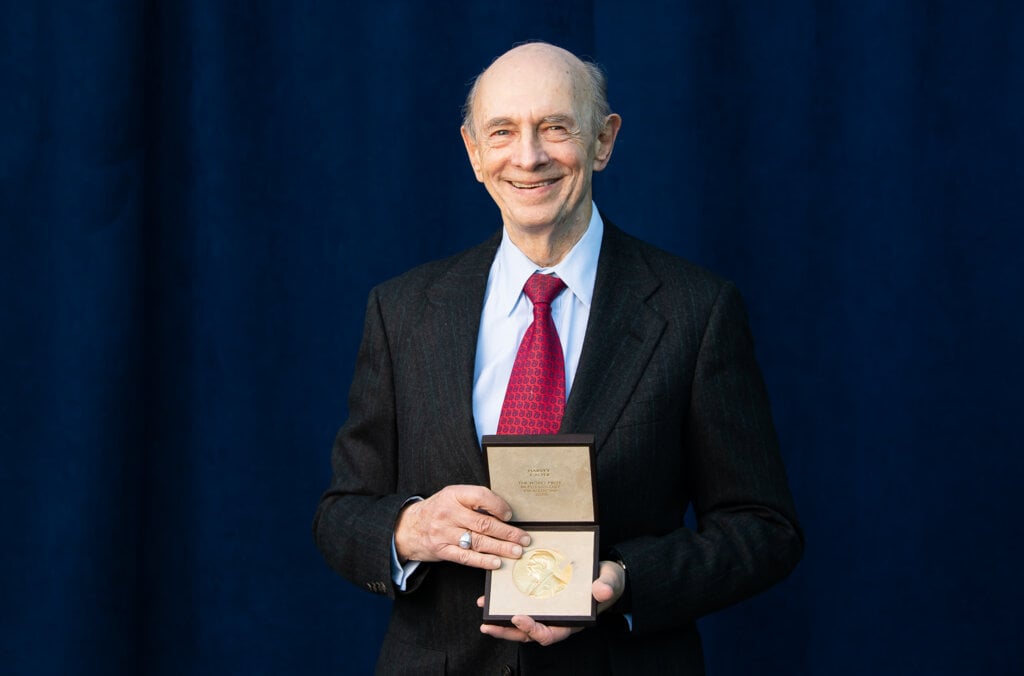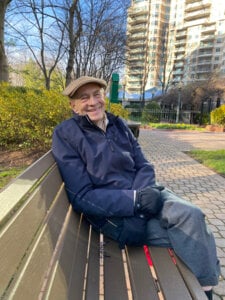Interview with Harvey J. Alter, December 2020
“I became the poet laureate of hepatitis”
Nobelprize.org interviewed Harvey J. Alter on 11 December 2020. We spoke with him about receiving the Nobel Prize, his journey in science and the roles humour and poetry have played in his work.
What does it mean for you to receive the Nobel Prize?
Harvey J. Alter: It’s such an unimagined honour. It’s not something I strove for, or thought would be possible in a clinical type of research. So it was nice that they recognised that this clinical piece was important. But I think any prize, and this one the most, is an acknowledgement that your peers respect what you did and think it was good. I always wondered how good it really was.

Presentation of the Nobel Prize in Physiology or Medicine to Harvey J. Alter at the National Institute of Health (NIH) on Tuesday, December 8, 2020 in Bethesda, USA. (Joy Asico/Nobel Prize Outreach)
© Nobel Prize Outreach. Photo: Joy Asico
Has it impacted your life already?
Yes, it’s turned it over. I decided to just enjoy it but there’s a huge burden that comes with it. Nice things but the number of emails and cards and things like that are enormous and I want to answer every one of them. I’ve answered hundreds already. But my, like my speeches, my answers are lot. Somebody says congratulations, I write back a paragraph. So I still have piles of people to answer. So that’s been a burden, but nice!
As a Nobel Laureate you will be a great source of inspiration for many people. Who inspired you when you were younger?
I learned something from everybody. I think my father in retrospect was a big inspiration because of his love of science, and he was a smart guy who to me could do anything. I’m kind of a gadget person, I can fix things and he was like that whatever it was he could fix it.
From Dr. Blumberg, I learnt persistence because he could have dropped this thing at any point. It was kind of bizarre finding this antigen. But he kept at it – he made a lot of wrong hypotheses and when they failed, he’d go to another one. And he kept at it and it proved to be the hepatitis B virus, and he got the Nobel Prize. So persistence was something I learned from him.
But every one of my mentors, every one of my collaborators taught me. And I had great bosses. I had bosses who were not into my research but who were so supportive to allow me to do it and to go to their higher ups to get funding to keep it going.
So for young people, I say, fine go to the best institution that you can get into. Find a mentor who wants more than just your hands. Somebody who wants to foster your career. It’s not easy to find that person, it’s not easy to start out. You know you can’t just start out de novo and have a great experiment. But if you go into somebody else’s lab and you find your own niche. I think that’s a good way to start out.
Did you have an early passion for science and research?
The short answer is no. I think I leant towards science for a couple of reasons … My father was very interested in science. He was not a doctor or scientist, but he was always reading science. He liked that, he didn’t like TV. So I had that influence.
And as a Jewish boy in New York it is kind of in your genes that you’re going to be a doctor. So that was in the background. But then I found in high school I really liked biology better than other things. I wasn’t good in math, I wasn’t going to be an engineer. So medicine was the natural place to go. And then when I got into med school, I loved it.

Harvey Alter in December 2020 during an interview with nobelprize.org
@ Nobel Prize Outreach. Photo: Anna Sjöström Douagi
What is the most stimulating part of your work?
It’s always fun. I’m a pretty collegial person. I worked with really brilliant people and so we had fun, I enjoyed coming to work every day. And I liked seeing patients, I could see patients and do research at the same time. It was always enjoyable, and there weren’t too many setbacks. You know the only setback was we couldn’t actually find the [Hepatitis C] virus per se.
So a lot of the enjoyment is collaborations and interactions with other people?
Yes, the NIH is such a unique place. Not only does it allow you time for things to play out, but it’s not competitive, everybody does their own thing. But if you have a question, there’s always somebody there who has some expertise that will help you.
Looking back at your life, what advice would you give the young Harvey? Would you tell him to take the same path as you have done – going into medical research rather than practice?
Yeah, definitely. And that wasn’t a path I planned to take. But once it happened, I couldn’t have had a better path, I don’t think I would have been happy in practice. I think I’m a good doctor, but the way you practice now you have to see patients so fast and there is also paperwork. At NIH, because I didn’t have a huge number of patients, I could see them, spend time with them, that’s what I enjoyed. And, you know, patients really appreciate when you give them time, they prefer that to good medicine.
Is it rewarding to see the direct results of your research by working with patients?
For me that was yes. I wanted to work in clinical practice, but didn’t go that way. But to still see patients but see them in the context of research and to bring something to conclusion in a paper and then go on to the next. You can’t have a better life.
It must be nice to say there is nothing you would change in your career path.
I had to be lucky too you know. The first person I worked with we happened to find the Australia antigen [Hepatitis B] while looking for something else. So serendipity and luck – finding that antigen is what got me back to pursue it further. If that hadn’t happened, I would have still been in practice.
So you know I can’t say to a young person, well, you go and you work hard, you’re going to get a Nobel Prize – you can’t predict that. But you won’t get it if you don’t work hard – I can say that. And you won’t get it if you don’t observe things well and you don’t collaborate well.
What advice would you give to a young researcher who is thinking of pursuing a career in science? Is it worth it?
Oh, yeah, I’d say it’s worth it. I think you have to try to find a balance between family and work. I didn’t find a very good balance for a long, long time. And then there are a lot of perks in academic medicine, you get invited to talk and go to wonderful places, you get treated well. So if you are lucky enough to find something or become an expert in some field, then there’s a lot of perks to it as well. But I would, if I could do it over again, spend more time with my family.
You read a poem about frustration in your Nobel Lecture. Can you tell us a little more about your interest in poetry?
I use humour in my talks, and much more than I used in the Nobel talk. I found poetry goes over very well. I started writing poems when people left the blood bank, they retired, they went to another job. And I would write a poem based around their name. And they were always very popular.
Actually I was at a meeting once in Rochester, New York, this is way, way back. About three speeches ahead of me guy gave a brilliant poem about cleaning the red blood cells. So I quickly scribbled down a four line poem so when my turn, I had a poem in response to his poem. And that went over well. Then I started writing poems for my talks, and I was a poet laureate of the transfusion world. And I became a poet laureate of hepatitis.
So humour has been important to you in your work?
For me it has been. Humour has been a way to get along with people, to teach, to collaborate. I’m not a stand up comic but funny things come into my head.
I have a good way with people and humour helps that. If you have a good way with people it’s more fun to work with them so it all ties up. Not only in work but in relationships … [my wife and I] both got woken up by the Nobel call and when I finally got back to bed she’d fallen back to sleep and I said: ‘That was Stockholm calling and I won the Nobel Prize.’ And she said, ‘Stop joking!’
That’s a problem when you tell a lot of jokes! Do you also cope well with failure and mistakes?
No! I don’t like to fail. I felt very secure at NIH so I never sought going into a new environment or starting over or becoming a Chief of Medicine. Position didn’t mean anything to me. Comfort meant a lot to me. I always thought if you’re happy where you are, why move, why change? Part of that was the fear of going somewhere and failing. I was already doing ok and I didn’t want to jeopardise that.
The Nobel Prize is given to a person who has achieved the greatest benefit of humankind. What would you say that the greatest benefit to humankind has been with your work?
Well my work, as a piece of a lot of people’s work, has eradicated post-transfusion hepatitis. And it looks like there’s no other agent out there of a hepatitis variety. And then, by leading to treatments of which I had nothing to do with, that are now 100% effective virtually and have no side effects – they’re amazing. So almost every patient I had has been treated now. We’ve got about 10 or 12 more to treat. And to see them so happy … it’s had a huge impact. And there’s still millions and millions of people that are silent carriers of hepatitis C that need to get treated.
Is there a discovery that you wish you had made?
I would have liked to do the cloning of Hepatitis C! I would have liked to write a really good book, not a science book, a good novel.
What would the title of your book be?
I haven’t thought about that. I can give you my epitaph – I’ve written that! It will be: ‘As in life, he ran out of time.’
This interview has been edited for clarity and length.
First published: January 2021
Nobel Prizes and laureates
Six prizes were awarded for achievements that have conferred the greatest benefit to humankind. The 14 laureates' work and discoveries range from quantum tunnelling to promoting democratic rights.
See them all presented here.
